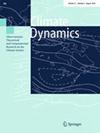Atmospheric response to seasonal changes in sea surface temperature during the boreal summer in the Tropical Atlantic
IF 3.7
2区 地球科学
Q2 METEOROLOGY & ATMOSPHERIC SCIENCES
引用次数: 0
Abstract
Abstract We investigate the atmospheric response to seasonal variations in sea surface temperature (SST) in the eastern tropical Atlantic during the boreal summer, using the Weather Research and Forecasting (WRF) regional atmospheric model. Three ensembles of 11 simulations each are produced with different SST forcings: the control ensemble (CTL) uses the observed climatology of the SST in 2000–2009, while the Frozen North (FzN) and Frozen South (FzS) experiments block the seasonal warming or cooling of the SST from June onwards in a region confined to the eastern tropical Atlantic. The result is a cold SST anomaly in the northeastern tropical Atlantic off the coasts of Senegal and Mauritania in FzN, and a warm anomaly in the southeastern region (Gulf of Guinea and the cold tongue zone in the equatorial Atlantic) in FzS. Comparison with CTL reveals significant impacts of these SST anomalies on the position and intensity of the marine intertropical convergence zone (ITCZ) and on West African rainfall during July and August. Over the ocean, the cold anomaly in NETA suppresses convection on the northern side of the ITCZ (north of 10 $$^\circ$$热带大西洋寒带夏季大气对海表温度季节性变化的响应
利用WRF区域大气模式,研究了北半球夏季热带大西洋东部地区大气对海表温度(SST)季节变化的响应。在不同的海温强迫下产生了3组11个模拟:控制组(CTL)使用2000-2009年观测到的海温气候学,而冻结北(FzN)和冻结南(FzS)实验阻止了6月以来局限于热带大西洋东部地区海温的季节性变暖或变冷。结果表明,热带大西洋东北部塞内加尔和毛里塔尼亚海岸的海温异常偏冷,而东南地区(几内亚湾和赤道大西洋冷舌带)的海温异常偏暖。与CTL的比较表明,这些海温异常对海洋热带辐合带(ITCZ)的位置和强度以及7月和8月西非降水有显著影响。在海洋上空,NETA的寒冷异常抑制了ITCZ北侧(10 $$^\circ$$°N以北)的对流,而几内亚湾的温暖异常则加强了其南侧的对流。后者还导致几内亚湾东北部沿海地区的降水急剧增加。这些变化明显是由于地表压力梯度的变化和低层水汽的辐散对海温异常的响应,进而通过热力反馈引起了大气深层对流的变化。在非洲大陆,观测到西部萨赫勒地区(特别是塞内加尔)在东部萨赫勒地区(特别是塞内加尔)在东部萨赫勒地区(特别是几内亚湾)在温暖异常之后降水大幅减少:两者都可以用对流层上层水汽输送辐散的正异常来解释,这与沿其南部边缘加速的非洲东风急流有关。然而,海温异常在这两个实验中产生这种加速的机制仍有待阐明。
本文章由计算机程序翻译,如有差异,请以英文原文为准。
求助全文
约1分钟内获得全文
求助全文
来源期刊

Climate Dynamics
地学-气象与大气科学
CiteScore
8.80
自引率
15.20%
发文量
483
审稿时长
2-4 weeks
期刊介绍:
The international journal Climate Dynamics provides for the publication of high-quality research on all aspects of the dynamics of the global climate system.
Coverage includes original paleoclimatic, diagnostic, analytical and numerical modeling research on the structure and behavior of the atmosphere, oceans, cryosphere, biomass and land surface as interacting components of the dynamics of global climate. Contributions are focused on selected aspects of climate dynamics on particular scales of space or time.
The journal also publishes reviews and papers emphasizing an integrated view of the physical and biogeochemical processes governing climate and climate change.
 求助内容:
求助内容: 应助结果提醒方式:
应助结果提醒方式:


